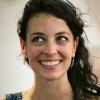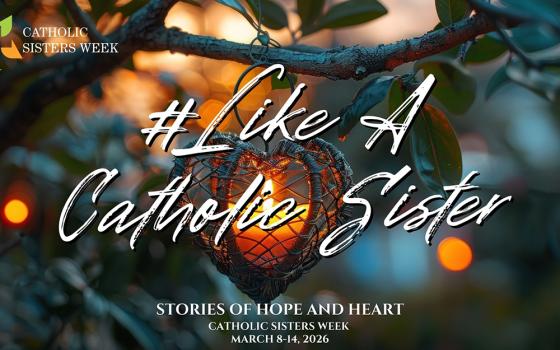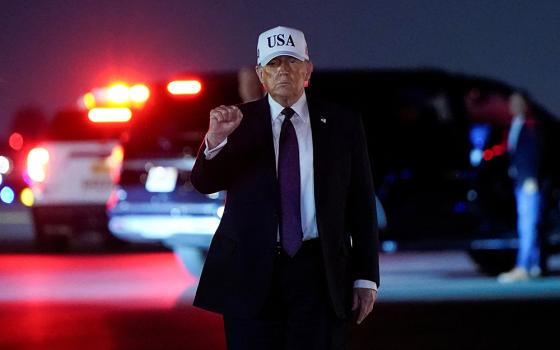
Dr. Valérie Julie Brousseau (Provided photo)
Because she has entered religious life twice, Dr. Valérie Julie Brousseau knows the communal living and shared spaces common in religious congregations. As soon as COVID-19 made its way to Canada, she became concerned about religious communities there, specifically in her home province, Quebec, which she worried may not take precautions to stay safe and get the care they need.
"This is going to be a harsh reality. People cannot say that their Mass or their sacraments are so important that they're willing to risk their lives and then complain about what's in place to protect their life," Brousseau said.
She has taken on the responsibility of educating religious communities, making herself available to their questions and helping them create contingency plans.
Brousseau, 41, grew up outside of Montreal and attended Pensionnat Notre-Dame-Des-Anges Catholic school, run by the Franciscan Missionary Sisters of the Immaculate Conception, and looked up to the nuns who taught her.
"They'd been missionary nuns, so they filled my childhood with amazing stories," Brousseau said. "These women were my superheroes. They were really cool."
She told her parents that when she grew up, she wanted to be a doctor, a missionary and a nun. Her life's path has touched each of these, settling on a career as an ear, nose and throat doctor who keeps her public health mission at the forefront.
When she turned 18, Brousseau entered the novitiate where she studied as a child, but she left a few months later after a mismatched mission placement, when it became clear she needed more freedom as a young woman. She also wanted to get back to her medical studies, and she completed undergraduate and master's degrees in biology and molecular genetics.
Brousseau went on to a joint medical and Ph.D. program at McGill University, with research opportunities in the United States. During her Ph.D. studies and medical residency, Brousseau faced and beat breast cancer. Because of this, she left the Ph.D. program but finished her medical residency. Her illness, age, and place in life had her questioning a lot, and she turned back to religious life after conversations with God.
In a year and a half working at a community hospital in Victoriaville, Quebec, Brousseau paid off her student loan debt, then entered a cloistered Carmelite monastery where she had found comfort during her time between hospital visits and cancer treatments. After grappling with following God's direction to enter the monastery and figuring out what her honest path should be, she only stayed for one year.
"Just because you go and leave doesn't mean you don't follow," Brousseau said. She said she learned a lot from the sisters and continues to remain faithful while answering God's call in ways that align with her interests and lifestyle.
Brousseau then worked for 10 years at a public hospital in Victoriaville, living in her farmhouse two hours outside Montreal. She spent her spare time farming and making and selling cheese.
Two years ago, she transitioned into her own practice in Montreal, which gives her a more flexible schedule and allows her to do public health work with religious communities.
"Being in the mission is just answering to reality around you; that's where your first mission is," Brousseau said. "You don't need to go far. You just need to be really anchored in where you are and try to answer that."

Dr. Valérie Julie Brousseau spends her vacations riding her motorcycle across Canada, the United States or South America. (Provided photo)
GSR: Why did you feel the need to connect with religious communities about the threat of the coronavirus?
Brousseau: I was really concerned that they would not get the attention and the advice they deserved. In Quebec, there are over 8,000 religious people, and the average age is 84 or older. I studied with nuns, and I entered religious life twice. For me, these were people I knew.
It was an obvious thing: They live together. They gather together several times a day to pray, and because of their way of life, that represented a very particular high risk.
You have to be realistic. We have maybe a year or a year and a half of trying to keep up with this. You should not get too excited once it gets in the house and not get too excited once you get rid of it. You may get it once, you may get it twice.
How have you approached religious communities?
The way I went about this was a very frank and honest discussion with the nuncio, Archbishop Luigi Bonazzi. Nuncio Bonazzi is the Canadian senior ambassador from the Vatican. He's based in Ottawa. He's the highest diplomat for the pope in Canada, and I happened to have met him through a friend.
When I saw this happening in Italy, I knew he was Italian, and I said, "That community in Italy, they're basically being ravaged by this disease."
And he said, "I come from Bergamo. I come from that area. I didn't know. I know these [Italian] nuns, I know these [Italian] priests. My God, what can we do?"
I said, "Well, I'm very concerned because it's going to happen in Canada, too. So what can we do to actually protect them or help them protect themselves?"
He came on board right away. He put me in touch with the Canadian Religious Conference, and then we decided to set up a continuing education webinar that took place at the end of March. They made some advertisements for it, and I did it in English and in French.
I wanted religious communities to understand what the disease was. I wanted them to understand how it was spread, why it was important, about the fact that it was dangerous, what they could do as basic things to protect themselves, and I wanted them to be able to give me a call.
The fact that the government was giving general recommendations to nursing homes, [these religious houses] didn't feel that applied to them, even though it did. They thought that because they were active people and they were not in a nursing home, they just needed to do like everybody else as a family of four or five, and that was enough. But that's exactly where the problem is; they are not. When you have people gathering four to five times a day to pray; that's a major, major, major problem. They share bathrooms. They share everything. And that's a unique reality to religious life.
What are some key pieces of advice you are suggesting to religious communities?
Every day you wait to put people in confinement is a day where you get two or three cases, and these two or three more cases give you two or three more each. It's an exponential spread. This is something people have a hard time realizing.
If you don't want to spread illness throughout the house, then you have to live like smaller houses within the house. The smaller the group, the safer. But you have to make it functional.
Usually, I tell people anywhere between seven and 10 people is probably the best, so you're willing to accept that maybe you have seven to 10 people that get it, but no more than that. And within those groups, I try to divide risk factors. So if there's a number of people who are older or whose health are a little more fragile, I try to spread them around.
Advertisement
I try to spread authority. The last thing you want is all the authorities to hang out together because then they all get it, and they all may die. They're all incapacitated at the same time, so you can't do much. And then I try to spread the younger, more active members so they can act like primary caregivers if there's someone in the group that's unwell. That avoids them having to go to the hospital, so then we can tell them exactly what they need to do, what equipment they need, and then they can take care of the two or three sisters who are older in the group that are sick.
It's all about planning. It means you're taking the situation seriously, and you realize it's not just for the neighbors.
Where do you see the pandemic going within the religious communities?
Unfortunately, there are a number of communities that are deeply affected, and they don't talk about it. They don't talk about why, and they don't talk about what they should have done, and they don't even talk about how many deaths they've had or how many people affected they've had. This is really unfortunate because this means that the others are not realizing what's happening.
People need to take this seriously, and they need to realize that they could be next because this is going to last for another year, year and a half, before we have a vaccine. As displeasing as it is, if you are alive, you should thank God, and you should try to protect that.
It's very difficult for people to take on the task of preparing for this if they are not ready. And what I've found so far is that there's not that many people who are ready.
You have to tell them very concretely that somebody with gloves and a mask needs to set up [the cafeteria] trays ahead of time so nobody touches those trays with their own hands. All these open coffee/tea bars with all these snacks and fresh cookies: They need to stop doing that. You need to have somebody serve it. You can't have everybody touching all this.
What's your biggest concern at this time?
I'm not throwing in the towel because I'm not that type of person, but I'm a bit discouraged. Because I see that for them, it's so big that they cannot find the energy to do it, and they are kind of denying how far it can go and how risky it is.
I can't blame them, in a way, but it's just a recipe for disaster.
There's a place I know where there are 120 sisters, and they came in the infirmary. They were very late in taking some concrete measures for containment, and they have an 80% infection rate. They've already had like 20 deaths.
But they don't talk about it, and [others] don't realize it. I have to accept that, you know, you can't force people.
The whole point is life. So you have to be very vigilant; you have to be patient. You have to be very anchored in reality and understand that right now, it's not just survival of the fittest. It's the survival of who's able to adapt. And what we know today and what we have to do today is different than tomorrow.
[Dana Wachter is a freelance journalist and digital storyteller based in London, Ontario.]







